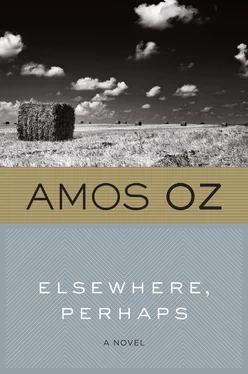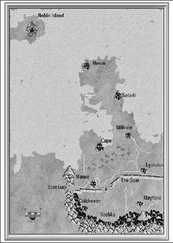The dining hall is brightly lighted. The air is warm and damp, and full of din and bustle: the clatter of cutlery, the murmur of conversation, the squeaking of food carts, the rattle of pots and pans from the sinks on the other side of the open partition. The tables are covered with brightly colored formica. The walls are adorned with landscapes, with symbolic representations of labor and with portraits of the founders of the kibbutz movement. On each table there is a tray of crisp brown bread, a dish piled high with fruit, colorful receptacles for salt, pepper, oil, lemon juice, and mustard, bowls of butter and cheese and home-made apple preserves, and a gleaming stainless-steel teapot. In the middle, a big bowl for rubbish and leftovers, and next to it a jam jar full of water with a pretty arrangement of flowers and greenery.
At our table there are six people. That's the rule. No new table is to be used until all the seats have been taken at the previous ones. That way it's more orderly.
Herbert Segal, a short, compactly built man wearing rather old-fashioned steel-rimmed glasses, belongs to the German party. (There are two groups in the kibbutz, those from Germany and those from the area around the Russian-Polish border, which used to be Poland but is now in Russia.) Segal is in charge of education in the kibbutz. This work, however, occupies only his spare time. His profession, which he has followed for twenty-seven years now, is dairy farming. He is a man of exceptional talents and a broad outlook who spends his evenings reading Marx and Hegel, Proudhon, Duhring, Lassalle, Saint-Simon, and Rosa Luxemburg. This kind of farmer you will find only in a kibbutz. In his youth Herbert Segal published large numbers of articles before he stopped writing. If he had embarked on a career of communal service, he would have shone among the bright lights of the kibbutz movement. He did not do so, partly because his outlook is slightly to the left of that of the movement, partly because he is a man of firm principles who spurns fame. Instead, he has given himself now, since Eva Harish's departure, to the running of the classical music circle. He himself plays the violin, in an amateur way. If only fate had supplied him with the right wife instead of leaving him a bachelor, we would say that he had managed to strike a perfect balance in his life. This balance is apparent in his measured way of eating, with formal table manners that years of manual labor have not overcome. His shy, fleeting smile has charmed us completely. If ever we have to face moments of pain or embarrassment, we can rely on Herbert Segal to come to our help, out of a spirit of true, quiet, uncalculating friendship. His sensible, sensitive tact is universally recognized and appreciated in the kibbutz.
While he eats, Herbert carries on a discussion with his neighbor, Grisha Isarov, a large man who is in charge of our fish ponds. Grisha has seven children, of both sexes, who are ranged according to age in the various children's houses. In the Second World War Grisha joined the Jewish Brigade and performed a number of remarkable feats in the Western Desert and in Italy, which he is fond of describing.
Grisha's table manners are appalling, and, what is more, his discussion with Herbert Segal has turned to subtle problems in crop rotation, which are really beyond his comprehension. Let us turn our attention, therefore, to the young people at our table, to Tomer Geva and his attractive companion Einav.
Tomer Geva is the elder son of Ezra and Bronka Berger. We are not taken in by the change of surname, because Bronka's bushy eyebrows, which meet in the middle, adorn her son's face, too. Tomer's features are not particularly regular. He has a large nose, thick lips, and broad, strong jaws, and black hairs protrude from his ears and nostrils. We are making his acquaintance over supper. If we could watch him at work, half-naked in a hayfield, glistening with sweat in the sunshine; if we could see him dancing, whirling furiously, defying gravity, his dark eyes under those bushy brows ablaze with vitality; if we could observe him on the basketball court, feinting and weaving light-foot-edly among his opponents, shooting with deadly accuracy — then we would understand what the girls see in him. A few months ago Tomer surprised us by deciding to marry one of his admirers. Einav is a quiet, pretty girl whose beauty is slightly marred by a limp. Einav's figure is not quite as it was: a slight bulge has already begun to distort the neat lines of her figure, and accentuate her limp.
Tomer is wearing his evening clothes, but they are not clean. His blue shirt is stained with mud and motor oil. Presumably, he has just been out to the fields to turn the irrigation taps on or off, perhaps to clear a blocked sprinkler. He lacks refinement, but his manner is friendly and captivating. Watch him cutting a slice of bread for Einav, leaning across the table to pass her a morsel of pickled herring or cheese, smiling at her stealthily from time to time. Einav responds in kind, and eagerly prepares him a rich, finely sliced salad.
Now let's wash down our meal with a hot or cold drink, whichever we choose, and nod farewell to the others at the table. We pause for a moment at the bulletin board, which is covered with announcements and lists of duties, glance at the headlines in the newspaper over the shoulder of Isaac Friedrich, the treasurer, and leave the dining hall. We can relax on a green bench on the edge of the lawn and contemplate the setting sun.
The twilight softens the scene and flatters the objects scattered around the kibbutz. Delicate shadows shift between the buildings, giving a heavy look to the trees and softening the sharp angles of the functional layout of the place. The lawns look less regular now than they are. Even the concrete paths, thanks to the subtle interplay of shadows, have lost their usual aggressive straightness. Round about stretch meadows and gardens, relishing the fresh breeze and responding to it with a sigh and the suggestion of a seductive tremor.
If we look up toward the mountains to the east, we will find them still bathed in sunlight. The dazzling light, driven away from where we are, has taken possession of the hilltops and entrenched itself there. As a result, they seem farther away than they really are, as if storming new heights. The sky has lost its daytime color, a yellow gray, and turned a startlingly clear shade of blue.
The air is laden with faint sounds. A silence settles on our village, as if a stately caravan were noiselessly crossing the village, a caravan that we cannot rightly name but whose presence we can sense in our throats, full of sorrow and hope and unspecified yearnings.
What a pity the twilight disappears so quickly in these parts. Our sun sets abruptly. The hills to the east are already growing dark. They are vanishing, deserting us, disappearing behind a dark screen. Their summits still hold a dimly capering yellow-purple light, but that, too, grows fainter every moment.
Now huge blocks of shadow come falling down the hillside. They fall in total silence, observing some strange law of gravity. The mountains are trying to bury us alive in an avalanche of shadows. The last rays catch some metallic objects for an instant, a flashing sign of the menacing presence of enemy positions on the mountainside. Little yellow and green lights appear in the enemy camps. A hostile, menacing, terrifying presence. That is why at this moment powerful white lamps go on all round the perimeter of our village. That is why the searchlight on top of the tall water-tower starts lashing the surrounding fields, groping undecidedly, challenging the hillside with a hungry beam of quivering brightness. Another searchlight comes on opposite, and slithers all over us, pawing us with its vicious bright fingers. The suspicious, unfriendly dialogue continues without a word being exchanged.
Читать дальше












